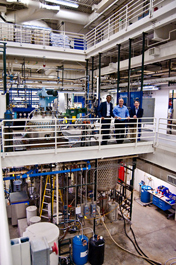Fueling Michigan's Biobased Economy
- Bryan K. Ritchie
- Associate Professor of International Relations, James Madison College
- Associate Director, Office of Biobased Technology
- Co-director, Michigan Center for Innovation & Economic Prosperity

Bobby Bringi, Bryan Ritchie, and Bruce Dale (L to R) discuss design of specialized equipment for biomass testing in Prof. Dale's laboratory. The lab develops and studies methods designed to convert biomass into useful fuels.
How can Michigan State University connect its biobased technology expertise with private sector partners in a way that helps the partners, facilitates the research taking place on campus, and re-invigorates Michigan's economy? That's the challenge Bryan Ritchie has been addressing for the past year. Having spent more than 10 years in the computer industry as an entrepreneur before entering academe, Dr. Ritchie is more than up to the challenge, as evidenced by the partnerships he has already helped create.
Re-energizing Michigan's entrepreneurial and innovative spirit by creating relationships between University researchers and the private sector and mobilizing the under-utilized talents of MSU students, especially undergraduate students, in these efforts, is part of Ritchie's mission.

MBI's state-of-the-art bioprocessing plant, located adjacent to the MSU campus on Collins Road in Lansing, Michigan.
As Associate Director of the Office of Biobased Technology (OBT), Ritchie leads its external alliances and strategy. Instead of the "traditional" model—inviting potential partners and funders to come look at the university's various assets and programs—Ritchie has customized what he calls "partnerships of discovery," in which he asks potential partners to tell him what challenges they face, including technical, social, political, and governmental. He then draws together a team capable of addressing those issues. This approach effectively targets exactly what the firms need, and helps them solve their problems while faculty pursue their scholarly research. Ritchie also helps direct companies to MSU's resources through a kind of "one-stop shop" for potential partners.
In addition, Ritchie connects partners with MBI International, a wholly owned subsidiary of the MSU Foundation, led by Dr. Bobby Bringi, president and CEO. With MBI, MSU has created "BioCollaborate," where partners can have their scientists work side by side with MSU and MBI scientists. For example, scientists from Denmark-based Novozymes are currently working with MSU to test ammonia fiber expansion (AFEX), a patented technology that MSU owns, with Novozymes' enzymes. When a new product is developed jointly, MSU and the company involved jointly license it.
In the past year, Ritchie has helped create the groundwork for several partnerships that he believes are the beginnings of long term relationships with private sector companies such as Vermeer Corporation, in Pella, Iowa; The Andersons, Inc., in Maumee, Ohio; and Novozymes. Another partnership is being formed with the U.S. Department of Energy's National Renewable Energy Laboratory.
Ritchie's work with the Michigan Center for Innovation & Economic Prosperity complements his efforts with OBT. The Center works to connect undergraduate and graduate students in research partnerships with companies such as IBM and Infosys, which allows students to do applied research in a real world environment. This is also a way to keep MSU graduates and their talents in Michigan rather than have them leave the state for jobs elsewhere. The Michigan Economic Development Corporation is co-sponsoring this work.
The area of biobased technology and entrepreneurship presents many opportunities for economic development and prosperity in Michigan. "We have tremendous assets within the university—including faculty and students, especially students," said Ritchie. "We need to connect all of these to the private sector." Ritchie is not only creating partnerships that will benefit Michigan's biobased technology economy in the present; he is also helping to create local jobs and ensure that his students will continue to apply their innovative ideas and entrepreneurial and research skills in Michigan's economy well into the future.
- Written by Cathy Gibson, University Outreach and Engagement